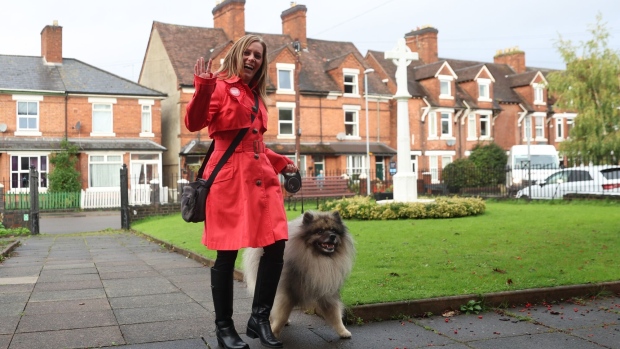Oct 19, 2023
Starmer’s Labour Overturns Large Tory Majority to Take Tamworth
, Bloomberg News

(Bloomberg) -- The opposition Labour Party overturned huge Conservative majorities to win two parliamentary seats, boosting leader Keir Starmer’s hopes of ousting Rishi Sunak as prime minister in a UK vote expected next year.
The results in Mid Bedfordshire, which had voted Conservative continuously since 1931, and in Tamworth will bolster the view that Labour is translating a long-held lead in national opinion polls into votes. They put the party on course to win back power from the Conservatives for the first time since 2010.
Labour has now won three by-elections with swings of 20% or more from the Conservatives this year. The last time that happened was in the run-up to the 1997 general election won by Tony Blair, according to John Curtice, a polling expert and politics professor at Strathclyde University. Victory in Rutherglen and Hamilton West earlier this month was also on a similar scale from the Scottish National Party.
“This isn’t destiny but it is a pointer,” Curtice said on BBC television on Friday. “Unless the Conservatives can fairly dramatically and radically turn things around then they are staring defeat in the face in 12 months’ time.”
Sunak’s team played down the significance of the results by arguing that mid-term elections are often difficult for governing parties. Yet the prime minister, who is on a two-day diplomatic visit to the Middle East, will face questions about his strategy and whether his attempt at a political reset this autumn is working. He risks more MPs deciding not to stand at the next election, adding to the dozens who have already said they will step down. The premier had yet to comment publicly on the results by early afternoon.
The Conservatives had attached considerable political capital to the result of a separate by-election in July, when they narrowly held Boris Johnson’s former seat in northwest London, seeing it as a path to turning around the party’s fortunes. The prime minister had rolled out a pro-motorist agenda and watered down the government’s green plans in the wake of the result.
“We need to think how we can deliver the message better to people,” Conservative Party Chairman Greg Hands told Times Radio after the results. “It was overwhelmingly the case that previous Conservative voters stayed at home, that’s obviously a big issue for us.”
Curtice said that holding Uxbridge and South Ruislip — where opposition to Labour Mayor of London Sadiq Khan’s plan to tackle air pollution by charging drivers of older vehicles was prominent in the campaign — was more of a “mirage than a pathway to a Conservative recovery.”
Sunak failed to secure a poll bounce coming out of his party’s annual conference, when he also scaled back the UK’s flagship HS2 high-speed rail project. His Tories still trail Labour by about 20 points in national surveys.
It was a night of discouraging superlatives for Sunak. Starmer’s opposition party won a 23.9-point swing from the Tories in Tamworth — just beating the 23.7-point swing it recorded when winning Selby and Ainsty in July. It was the second-largest swing to Labour at a by-election since 1945.
The swing was smaller in Mid Bedfordshire, a mostly rural district north of London, at 20.5-points. But the Tories were defending a majority of almost 25,000 there, making it the biggest numeric majority ever overturned in a by-election.
“It is clear that the voters here have turned their back on a failed Tory government,” Starmer told Labour activists in Mid Bedfordshire on Friday. “They’ve had enough of decline in the last 13 years and they’re crying out for change.”
Alistair Strathern won the seat with 13,872 votes, ahead of Conservative Festus Akinbusoye on 12,680 votes and Liberal Democrat Emma Holland-Lindsay with 9,420. “Nowhere is off limits for this Labour Party and tonight’s result proves it,” Strathern said.
Still, Liberal Democrat deputy leader Daisy Cooper said the result was as much about her party taking votes from the Conservatives as the win for Labour. “The Liberal Democrats played a crucial role in defeating the Conservatives in Mid Bedfordshire, and we can play a crucial role in getting rid of this Conservative government at the next election.”
In Tamworth, Sarah Edwards was elected to Parliament with 11,719 votes, ahead of Conservative Andrew Cooper on 10,403. The town sits northeast of Birmingham, the UK’s second-biggest city where the HS2 line will now terminate rather than continue further north up to Manchester.
The loss of Tamworth will also hit hard with die-hard Tories. It was the birthplace of the so-called Tamworth Manifesto by former leader Robert Peel in 1834, which laid down the principles of the modern Conservative Party.
Both by-elections had a connection to Johnson, the ex-prime minister. The Mid Bedfordshire vote was triggered by the resignation of Nadine Dorries, a close ally whose lack of attendance in Parliament was the subject of fierce criticism. She issued a rebuke of Sunak’s leadership when she quit at the end of August.
Meanwhile Tamworth’s by-election was called after former MP Chris Pincher stood down following allegations last year that he had groped two men. Johnson’s efforts to defend Pincher, who was then a government minister, triggered a backlash that was a major part of the former premier’s downfall.
Read more: Johnson, Once a Tory Winner, Is Desperate for Them to Lose
Of the four seats made vacant by Johnson and his allies this year, Sunak’s party has now held onto only one.
“People feel worse off after 13 years of the Conservatives and don’t feel like the government have a plan to address the big issues that face our country,” said Edwards, Labour’s new MP for Tamworth. “My message to the prime minister is get in your government car, drive to Buckingham Palace, do the decent thing and call a general election.”
--With assistance from Andrew Atkinson and Alex Morales.
(Updates with Starmer comment in 12th paragraph)
©2023 Bloomberg L.P.








